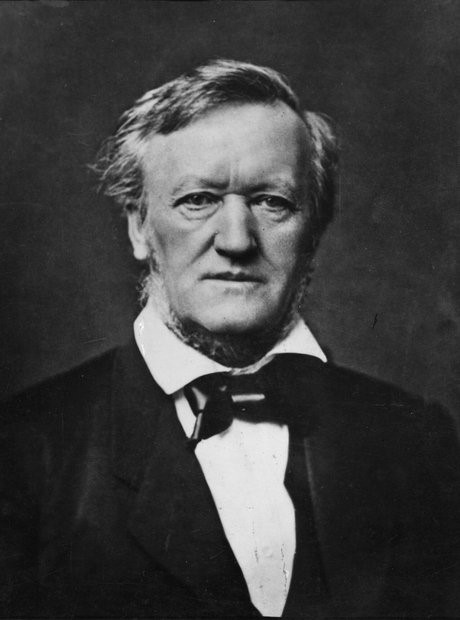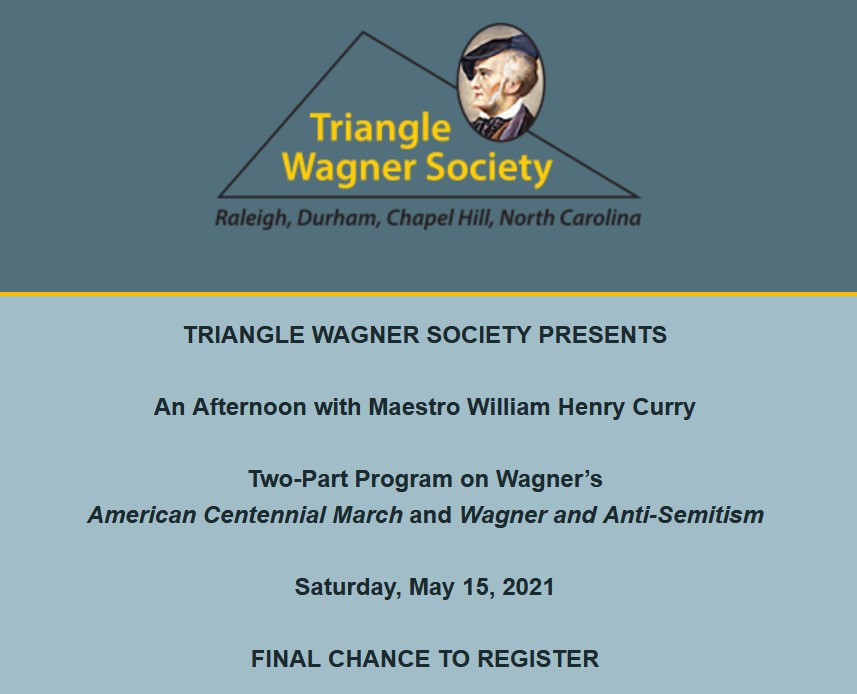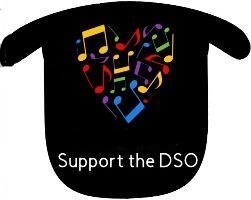Monday Musicale with the Maestro – May 10, 2021 Inspiration, Disillusionment, and Destiny: My Complicated Love Affair with the Music of Richard Wagner.
When I was 13 years old, I was just beginning my love affair with classical music. I was playing the viola in a youth symphony orchestra, and we were playing Wagner’s Prelude to his opera Die Meistersinger von Nürnberg (The Master Singers of Nuremberg). Suddenly, in the middle of the first lyrical theme, after the brass fanfares, I had what can only be called an out-of-body experience. I felt like I was floating around the room. No, that’s not accurate. I knew I was floating around the room. From that moment, classical music was my destiny, and Wagner was one of my heroes.
I will never know if this love for classical music would have happened if I hadn’t started playing instruments in the sixth grade. Many people miss the chance to fall in love with this music (one of the glories of Western culture) because they have not had the experience of playing it—and by this, I mean singing or performing it on an instrument, not playing a CD. Once you learn that you can express your feelings, your deepest and most private thoughts, through making music yourself, then there is no looking back. You are transformed.
My parents couldn’t afford instruments and music lessons, and the all-Black Lincoln Park Elementary School I attended received only the minimal amount of money from the all-white school board. To them, we were an outlier school of “hopeless colored kids.” To say that we were “underserved” would be the worst kind of understatement! We had no music programs, no arts classes, and no sports.
Also, the entire staff of principals and teachers (except for one woman) was white, and in terms of its leadership, the environment was poorly suited for encouragement, uplift, or even basic empathy. The day after Martin Luther King was assassinated, the principal (Emory G. Casey) came down to the cafeteria to get his morning coffee. My mother was one of the workers there. (I should note here that ALL the cafeteria workers were Black women, and ALL the janitors were Black.) As my mother served Mr. Casey his coffee, she apologized for being distracted by King’s murder. He looked up at her from the table and said flatly, “King got what he deserved. He was a communist.” I suspect that Casey is dead and buried now. I hope he never had his own children to poison with such bigotry and obliviousness.
Fortunately, there were a few teachers who were genuinely engaged with the students. My fourth-grade teacher, Miss Hicks (the only Black teacher there), took a special interest in my brother and me as promising young persons with the highest IQ scores in the history of that school. Miss Hicks was the only adult in my elementary school who ever reached out to me to help me–and in fact, the only Black teacher I encountered through 12 years of public school and 4 years of college!
When I was in sixth grade, an even more important influence arrived. He was Eugene Reichenfeld—a Jewish “Pied Piper” of music, who took it upon himself to give all Black kids interested in music free instruments and lessons. He became a true mentor, later guiding me in conducting and composing, and this explains why I revere Durham’s Kidznotes and Raleigh’s Home Community Music School above nearly all arts institutions in North Carolina. Their mission is the same as Eugene Reichenfeld’s, and they are truly transforming lives.
At the age of 15, I made my conducting debut, and I ended the concert with Wagner’s Meistersinger Prelude, the work that had—as if by magic—showed me my destiny. After high school, I accepted a scholarship to attend the Oberlin Conservatory, and the first music history class I signed up for was a course on Wagner. The teacher was wonderful, and we were reading what was then considered the definitive biography of Wagner, Robert W. Gutman’s Richard Wagner: The Man, His Mind, and His Music. I was enthralled to learn more about the composer and his music.

But then my world crashed in on me. In the middle of the book, Gutman revealed that Wagner was anti-Semitic and noted him as the most appalling racist in the history of classical music.
How can I describe the effect of that revelation? At 18 years old, I had already been seared by the incendiary and demonic nature of American racism. Not to mention the bigotry I’d had to endure as a young gay person, who was considered by most Americans (both Black and white) to be “a genetic mistake.”
This revelation about Wagner was like catching your beloved father in bed with a woman other than your mother. And yes, in the spectrum of young person’s first traumas, it was a good deal worse than finding out there is no Santa Claus or not attending the school prom. I wouldn’t—COULD NOT—listen to Wagner for the next two years.
By the time I had reached my mid-20s, however, I had made a truce with Wagner by saying, “Hate the man; love his music.” And the music IS so great that, yes, I still feel its transformative and magical powers. No composer has ever written greater music for the stage, and his influence on the history of music is rivaled only by Bach, Beethoven, and Stravinsky. This music cannot be ignored and should not be discounted because of Wagner’s grievous personal flaws. Every conductor and Wagner fan must at some point forge a way through the dark thicket of bigotry that surrounds and sometimes threatens to choke off Wagner’s legacy.
On May 15, one week before Wagner’s birthday, I will be lecturing on this subject at the invitation of the prestigious Triangle Wagner Society. This is the second time these extremely knowledgeable lovers of Wagner’s music have so honored me. In the 1990s, I also spoke twice about this topic at Duke University, and I published a 4000-word article on the topic for the NC Symphony’s Opus Magazine (Spring 2004).

Registration information can be found here.
I hope you will be able to join TWS and their guests next Saturday. The other subject to be discussed is Wagner’s last stand-alone orchestral work (not from an opera), the American Centennial March. As the title suggests, this was written to honor the 100th birthday of the United States of America.
In 2013, during Wagner’s bicentennial, the DSO and I featured a rare performance of this work. In doing extensive research on the piece, I found a virtually unknown letter from Wagner to the conductor of the premiere, pointing out a crucial feature which had somehow been omitted from the score! I was extremely excited to learn that there had never been a recording of the piece with the additions Wagner noted in this letter. But even more remarkably I could find no mention of them anywhere in the standard Wagner books or other sources to indicate that this march had ever been performed (even at its premiere) in accordance with Wagner’s verbal instructions. It seemed a strong possibility, then, that the Durham Symphony Orchestra was the first orchestra ever to play Wagner’s last orchestral work as the composer intended it to be performed! I hope you will join TWS on Saturday to find out more about the “mystery’ surrounding this piece and the DSO’s involvement in it.
As a “teaser” for my lecture I would like to share with you here another work by Wagner that was included in the same DSO program with the American Centennial March. This is the thrilling overture to Wagner’s first successful opera, Rienzi, written when he was 25. It’s a powerful work that reveals Wagner’s genius in many ways: its majestic melodies, its overpowering technicolor orchestration, and its deep seriousness—a glimpse of the composer whose next opera (The Flying Dutchman) would begin changing the world of Western art music.
William Henry Curry, Conductor
Durham Symphony Orchestra
I hope you have enjoyed reading my series of 55 consecutive Monday blogs as much as I have enjoyed writing them. These essays were initiated when the DSO went on hiatus due to COVID-19, and we look forward to continuing them in some fashion. But as we turn at last to preparing our exciting schedule of live music for 2021-22, the Musicales may appear less frequently and perhaps with slightly different content.
In the meantime, we look forward to sharing more about our upcoming season with you soon! You’ll be pleased to see the return of annual favorites such as our Tribute series at Hayti and our Holiday Pops concert at the Durham Armory. We also have some exciting surprises planned—including a program at Durham School of the Arts which will feature several student groups, a world premiere, and exciting favorites such as Wagner’s Ride of the Valkyries and Tchaikovsky’s 1812 Overture.
As always, I look forward to hearing from you online—and to seeing each and every one of you as we re-enter the brave new world of live performance!
William Henry Curry
Music Director
Durham Symphony Orchestra
Comprehensive Editor (Text): Suzanne Bolt
Copy Editor: Tina Biello
Digital Layout and Publication: Tina Biello
Video Mixing & Mastering: Max Wang

“Monday Musicale with the Maestro”
would not be possible without your support!
Thank you for being an important part of the
Durham Symphony Orchestra family!
We gratefully acknowledge support from the City of Durham, Mary Duke Biddle Foundation, the Durham Arts Council’s Annual Arts Fund, and the N.C. Arts Council, a division of the Department, of Natural and Cultural Resources.
. 



